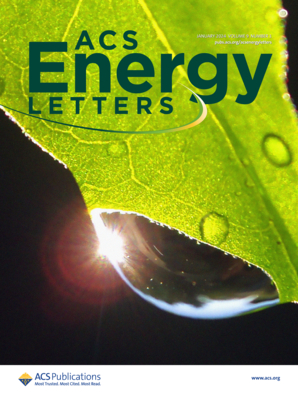Ternary Eutectic Electrolyte for Flexible Wide-Temperature Zinc-Ion Batteries from -20 °C to 70 °C
IF 19.3
1区 材料科学
Q1 CHEMISTRY, PHYSICAL
引用次数: 0
Abstract
Aqueous Zn-ion batteries (ZIBs) have attracted attention for grid applications due to their cost-effectiveness and high security. However, their lifespan decreases at high temperatures due to declining interfacial stability and increased side reactions. To address these challenges, a ternary deep eutectic solvent-based flexible electrolyte, comprised of ZnClO4·6H2O, butanedinitrile (BD), and LiCl in an amphoteric polymer matrix, was developed to enable wide-temperature ZIBs working from -20 °C to 70 °C. The interactions among BD, Li+, and zinc hydrate alongside the amphoteric groups on the polyelectrolyte matrix could effectively suppress the interfacial side reactions and Zn dendrites formation. Consequently, the symmetric Zn cell demonstrates exceptional stability across a wide-temperature range, with the ability to survive up to 2780 hours (1 mA·cm-2) at 50 °C. Furthermore, the flexible Zn||PANI battery can operate stably over 1000 cycles at 50 °C, boasting an initial specific capacity of 124.8 mAh·g-1 and capacity retention rate of 87.9% (3 A·g-1). This work presents an effective strategy for designing high-stability energy storage devices with excellent security features that can function reliably across diverse temperature conditions.用于 -20 °C 至 70 °C 灵活宽温锌-离子电池的三元共晶电解质
锌离子水电池(ZIBs)因其成本效益高和安全性高而在电网应用中备受关注。然而,由于界面稳定性下降和副反应增加,它们在高温下的寿命会缩短。为了应对这些挑战,我们开发了一种三元深共晶溶剂型柔性电解质,由 ZnClO4-6H2O、丁二腈(BD)和氯化锂组成,置于两性聚合物基质中,可在 -20 °C 至 70 °C 的宽温条件下工作。BD、Li+ 和水合锌之间的相互作用以及聚电解质基体上的两性基团可有效抑制界面副反应和锌枝晶的形成。因此,对称锌电池在很宽的温度范围内都表现出了极高的稳定性,在 50 °C 下可存活长达 2780 小时(1 mA-cm-2)。此外,柔性锌||PANI 电池可在 50 °C 下稳定运行 1000 次,初始比容量为 124.8 mAh-g-1,容量保持率为 87.9% (3 A-g-1)。这项研究为设计具有出色安全性能的高稳定性储能装置提供了一种有效策略,这种装置可在不同温度条件下可靠地工作。
本文章由计算机程序翻译,如有差异,请以英文原文为准。
求助全文
约1分钟内获得全文
求助全文
来源期刊

ACS Energy Letters
Energy-Renewable Energy, Sustainability and the Environment
CiteScore
31.20
自引率
5.00%
发文量
469
审稿时长
1 months
期刊介绍:
ACS Energy Letters is a monthly journal that publishes papers reporting new scientific advances in energy research. The journal focuses on topics that are of interest to scientists working in the fundamental and applied sciences. Rapid publication is a central criterion for acceptance, and the journal is known for its quick publication times, with an average of 4-6 weeks from submission to web publication in As Soon As Publishable format.
ACS Energy Letters is ranked as the number one journal in the Web of Science Electrochemistry category. It also ranks within the top 10 journals for Physical Chemistry, Energy & Fuels, and Nanoscience & Nanotechnology.
The journal offers several types of articles, including Letters, Energy Express, Perspectives, Reviews, Editorials, Viewpoints and Energy Focus. Additionally, authors have the option to submit videos that summarize or support the information presented in a Perspective or Review article, which can be highlighted on the journal's website. ACS Energy Letters is abstracted and indexed in Chemical Abstracts Service/SciFinder, EBSCO-summon, PubMed, Web of Science, Scopus and Portico.
 求助内容:
求助内容: 应助结果提醒方式:
应助结果提醒方式:


